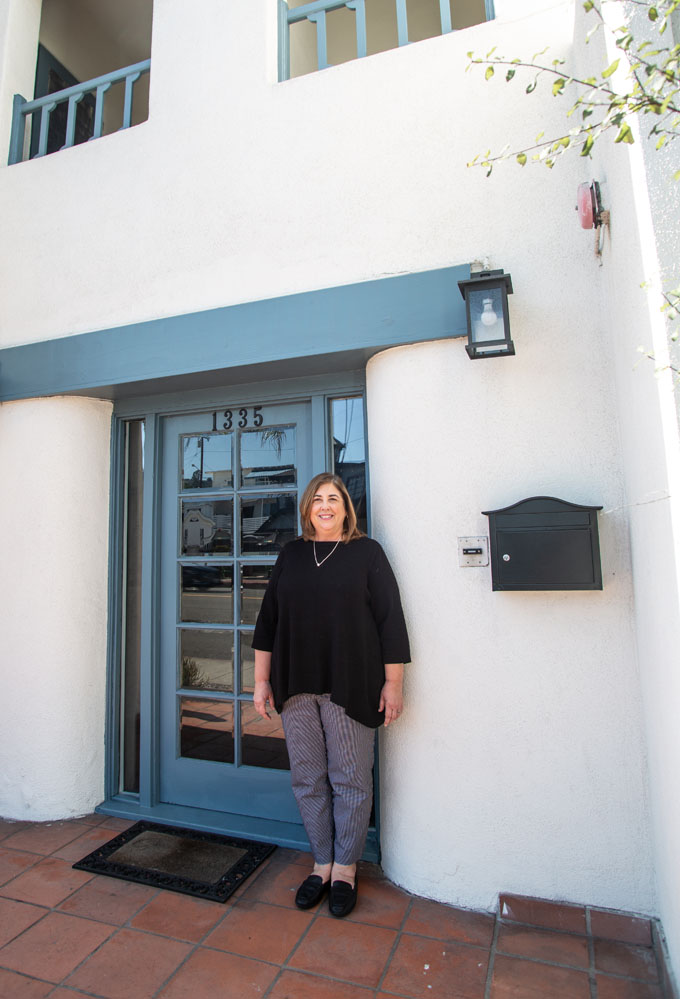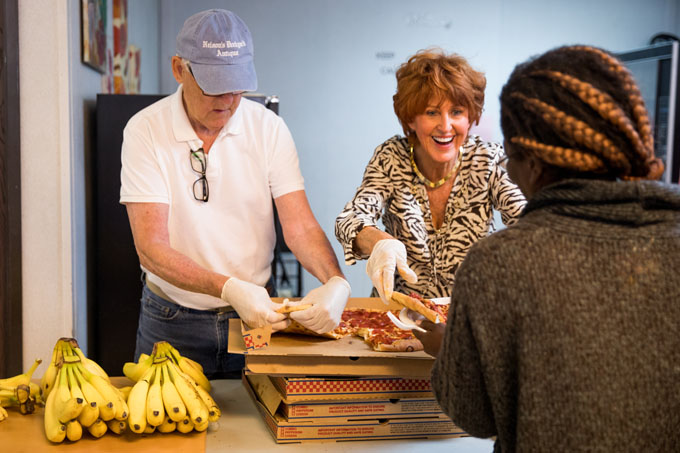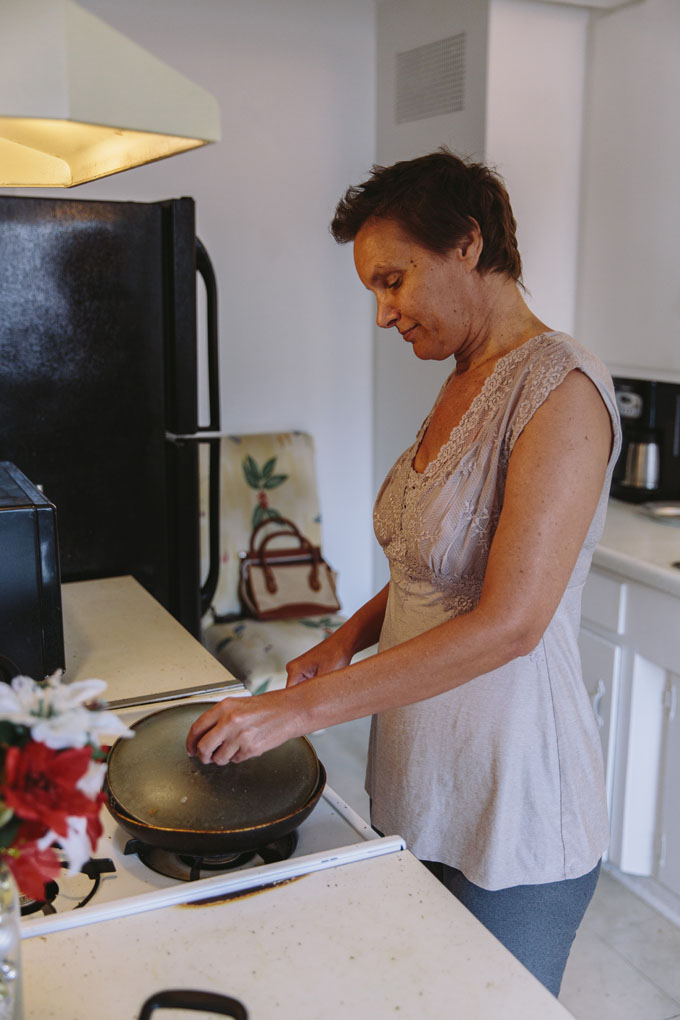
As homelessness continues to affect Orange County residents, the Friendship Shelter develops ways to fight the epidemic.
By Tanya A. Yacina
Founded in 1988, the Laguna Beach-based Friendship Shelter was originally an all-volunteer effort, loosely organized and led by the Rev. Colin Henderson. It operated out of St. Mary’s Episcopal Church until the flagship site on South Coast Highway was opened.
Serving as executive director of the Friendship Shelter for the past 11 years, Dawn Price got her start with the nonprofit after her professional connections encouraged her to apply. Although she had never worked in the homeless housing sector before, she had experience in nonprofit management and began her tenure under Henderson.
“One of the things I value most about [the] Friendship Shelter is that its origin story carries with it a set of values and sense of mission that survives to this day,” Price says. “The organization was founded by community members who saw a need in their community and wanted to fill it. They saw not just the homeless people who needed shelter and support, but also the impact that homelessness had on their community.”
Price says the organization strives to maintain that same sense of purpose—and dual responsibility to clients and locals alike—today. “We understand homelessness has an impact on everyone—and that ending homelessness helps both client and community,” she says. The nonprofit’s vision is to end homelessness in south Orange County, one person at a time, while also assisting homeless adults achieve independence and become productive members of society.
The Friendship Shelter receives funding from a variety of public institutions, from the state of California and Orange County to the city of Laguna Beach and the U.S. Department of Housing and Urban Development (HUD). Corporate and private funding as well as individual gifts also contribute to the shelter’s continuous operations, with a substantial amount of revenue coming from the shelter’s annual fundraising event. This year’s gala is scheduled for Nov. 1 at the Laguna Cliffs Marriott Resort & Spa in Dana Point.
“While the public funding is critical, the privately raised dollars [from] foundations and individuals are what fuel the growth,” Price says. “These funds plug holes in public funding, provide required matching funds and help ensure that our organizational infrastructure can grow to support program growth.”
According to Price, all communities that receive HUD funding are required to conduct a Point in Time count of homeless people at least every other year. The Friendship Shelter services Laguna Beach, as well as all of south Orange County, which includes cities like Irvine, Lake Forest and Dana Point.
“The most recent countywide count found 763 people experiencing homelessness [on one night] in the south OC area. Of those, 147 were in Laguna Beach,” she says. That local group included 75 in a shelter and 72 unsheltered. “Early records are difficult to find, but, at our 30th anniversary [last year], we estimated we had served 10,000 individuals,” she says. “Since then, we’ve averaged 500-600 shelter guests annually and we have 91 individuals in housing.”
Those interested in volunteer opportunities can visit the Friendship Shelter’s website at friendshipshelter.org to inquire. Price says the biggest need is for people or groups to prepare meals at the two shelters, but there is also a need for regular desk volunteers and special project volunteers, including volunteers at the annual fundraising gala.
Seeking Shelter
Not only for emergency situations, this local nonprofit offers a variety of housing options to fit every need.

In an Emergency
No matter what time of year it is, those seeking immediate shelter in a crisis can turn to the ASL Emergency Shelter, operated by the Friendship Shelter, a nonprofit organization. Located along Laguna Canyon Road, the Emergency Shelter offers two different types of programs. The first, a drop-in day option, operates from 10 a.m. to 1 p.m., for anyone that is looking for a meal, a shower or a place to do laundry. In addition, those stopping by during the day are able to take advantage of the resources available at the shelter, including social interaction, health care and treatment for mental illness. There is also an overnight program at the shelter, which gives homeless individuals the same opportunities and resources while also providing a place to sleep. Anyone enrolling in the overnight program must be approved, and will be admitted for a 30-day period. At the end of the 30 days, participants will have the opportunity to reenroll.

A Hand Up
The Bridge Housing Program includes a shelter in which homeless adults can live while the nonprofit helps them find a steady source of income. During their stay at the shelter, participants in the program receive complimentary meals and additional assistance, including housing coordination services, mental health support, addiction recovery aid and more. While immediate services are necessary, the Bridge Housing Program also looks at the long term, providing ongoing case management to assist residents in finding secure housing as well as permanent income, all of which helps increase their independence and allows them to flourish on their own. In addition to everything else the program offers, homeless men and women with housing vouchers from the county are also able to turn to the Friendship Shelter for assistance in locating the ideal home, and the organization will pay their move-in costs and deposit.

Extra Assistance
The Friendship Shelter’s fastest-growing program also doubles as its newest and has quickly found success among the local homeless population. This initiative was designed for those with physical or mental health conditions that affect their ability to prosper and cause them to be chronically homeless, and follows a “housing first approach,” which puts finding a residence as high priority while also connecting individuals with housing that doesn’t come with many entry requirements, aside from documenting homelessness and the disability itself. Placed in scattered-site apartments, as well as in three dedicated apartment buildings—including two owned and one leased by the Friendship Shelter—participants also have access to ongoing support services from the nonprofit’s staff members to help ensure continuous, safe and stable housing. This program is currently assisting nearly 90 homeless people or families in south Orange County, though it plans to lease another building by the end of the year, which will bring the total unit count to 108.




